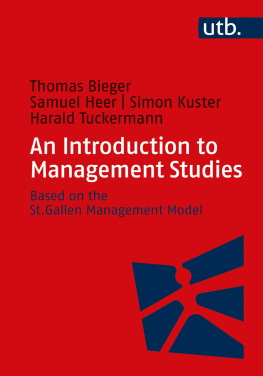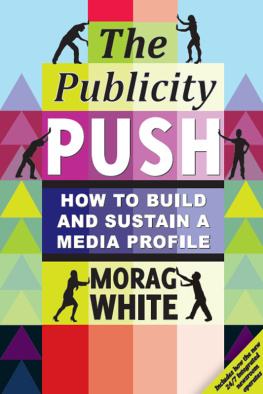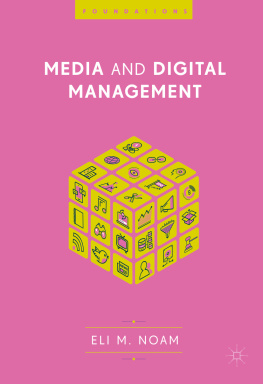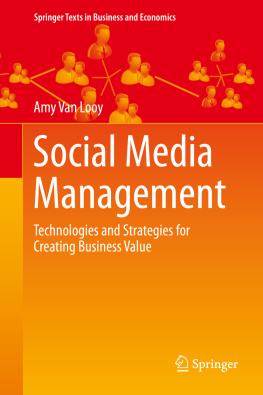
Media and Management
In Search of Media
Timon Beyes, Mercedes Bunz, and Wendy Hui Kyong Chun, Series Editors
Action at a Distance
Archives
Communication
Machine
Markets
Media and Management
Organize
Pattern Discrimination
Really Fake
Remain
Undoing Networks
Media and Management
Rutvica Andrijasevic, Julie Yujie Chen, Melissa Gregg, and Marc Steinberg
In Search of Media

University of Minnesota Press
Minneapolis
London

meson press
In Search of Media is a collaboration between the University of Minnesota Press and meson press, an open access publisher, https://meson.press
Media and Management by Rutvica Andrijasevic, Julie Yujie Chen, Melissa Gregg, and Marc Steinberg is licensed under a Creative Commons Attribution-NonCommercial 4.0 International License.
Published by the University of Minnesota Press, 2021
111 Third Avenue South, Suite 290
Minneapolis, MN 55401-2520
https://www.upress.umn.edu
in collaboration with
meson press
Salzstrasse 1
21335 Lneburg, Germany
https://meson.press
ISBN 978-1-4529-6603-8 (ebook)
Library of Congress ebook record available at https://lccn.loc.gov/2021028227.
The University of Minnesota is an equal-opportunity educator and employer.
Contents
Rutvica Andrijasevic, Julie Yujie Chen, Melissa Gregg, and Marc Steinberg
Marc Steinberg
Rutvica Andrijasevic
Julie Yujie Chen
Rutvica Andrijasevic, Julie Yujie Chen, Melissa Gregg, and Marc Steinberg
Media determine our situation, Friedrich Kittler infamously wrote in his Introduction to Gramophone, Film, Typewriter. Although this dictum is certainly extremeand media archaeology has been critiqued for being overly dramatic and focused on technological developmentsit propels us to keep thinking about media as setting the terms for which we live, socialize, communicate, organize, do scholarship, et cetera. After all, as Kittler continued in his opening statement almost thirty years ago, our situation, in spite or because of media, deserves a description. What, then, are the termsthe limits, the conditions, the periods, the relations, the phrasesof media? And, what is the relationship between these terms and determination? This book series, In Search of Media, answers these questions by investigating the often elliptical terms of media under which users operate. That is, rather than produce a series of explanatory keyword-based texts to describe media practices, the goal is to understand the conditions (the terms) under which media is produced, as well as the ways in which media impacts and changes these terms.
Clearly, the rise of search engines has fostered the proliferation and predominance of keywords and terms. At the same time, it has changed the very nature of keywords, since now any word and pattern can become key. Even further, it has transformed the very process of learning, since search presumes that, (a) with the right phrase, any question can be answered and (b) that the answers lie within the database. The truth, in other words, is in there. The impact of search/media on knowledge, however, goes beyond search engines. Increasingly, disciplinesfrom sociology to economics, from the arts to literatureare in search of media as a way to revitalize their methods and objects of study. Our current media situation therefore seems to imply a new term, understood as temporal shifts of mediatic conditioning. Most broadly, then, this series asks: What are the terms or conditions of knowledge itself?
To answer this question, each book features interventions by two (or more) authors, whose approach to a termto begin with: communication, pattern discrimination, markets, remain, machine, archives, organize, action at a distance, undoing networksdiverge and converge in surprising ways. By pairing up scholars from North America and Europe, this series also advances media theory by obviating the proverbial ten year gap that exists across language barriers due to the vagaries of translation and local academic customs and in order to provoke new descriptions, prescriptions, and hypothesesto rethink and reimagine what media can and must do.
Platform Capitalism Has a Hardware History
Rutvica Andrijasevic, Julie Yujie Chen, Melissa Gregg, and Marc Steinberg
Managements Mediation
Whether it is considered a science, a professional discipline, an operation of control, or a technique of self-enhancement, management is a cultural practice that takes different forms over space and time. This book argues that management is enabled by various forms of media, just as those media give life to management. By media we refer to the large and small objects and technologies that transmit, produce, or encircle the practice of management and its experience by workers. Knowing that management ideas are produced through deliberate techniques of composition, persuasion, and interpellation is an important step toward resisting the commonsense imperatives that govern our lives, whether at work, at home, or in the many worlds between.
Over time, the stopwatch, the punch card, the calculator, and the camera are but a selection of media types that have catalyzed management innovations (Beyes, Holt, and Pias 2019). Theories of management are constantly manufactured and disseminated through printed and virtual textbooks, mass-market self-help paperback guides, TED talks, corporate consulting, and other motivational genres (Gregg 2018). More recently, sensing and positioning capabilities embedded in smartphones and watches have made management all the more intimate, as disciplinary technologies nudge the mind and body with corrective haptics. In the age of platform capitalism (Srnicek 2016), hardware and software protocols encourage new governance techniques and forms of pattern discrimination (Apprich et al. 2018). Workers are learning to adjust their speed and motions to algorithmically defined rhythms that are often purposefully designed to remain elusive (Siciliano 2017). Through each stage of the evolving relationship between workers and employers, producers and consumers, management is learned and disseminated through media, while new media formats produce fresh opportunities for subjectification and control.
It remains novel to examine management from the angle of its mediations. Building on the authors complementary backgrounds, this book provides insight on the changing models of labor composition, performance, and governance that are not only characteristic of present experience but generative of global dependencies. We pay close attention to the geographies and histories of media and their complementary coexistence with management.
The title Media and Management may suggest our aim is merely to add media to existing management analysis. However, for us media are not a qualifier for management, they are how management works. The field of media management already deals with the operation of the media industries in particular. Our concern is with the interpenetration of media in all aspects of management, showing how management always manifests through media and through various mediations. It is this mediamanagement nexus that the chapters in this volume track in distinct ways: from the use of kanban cards in the Toyota automobile production system, to the dependence on Facebook for recruiting workers on a just-in-time basis, to the mediation of government policy and third-party staffing agencies in app-based food-delivery services. Our basic claim is that these managerial techniques should be the object of media studies as much as television or Netflix; conversely, management should be as concerned with media as it is with efficiencies or organizations.
Next page









